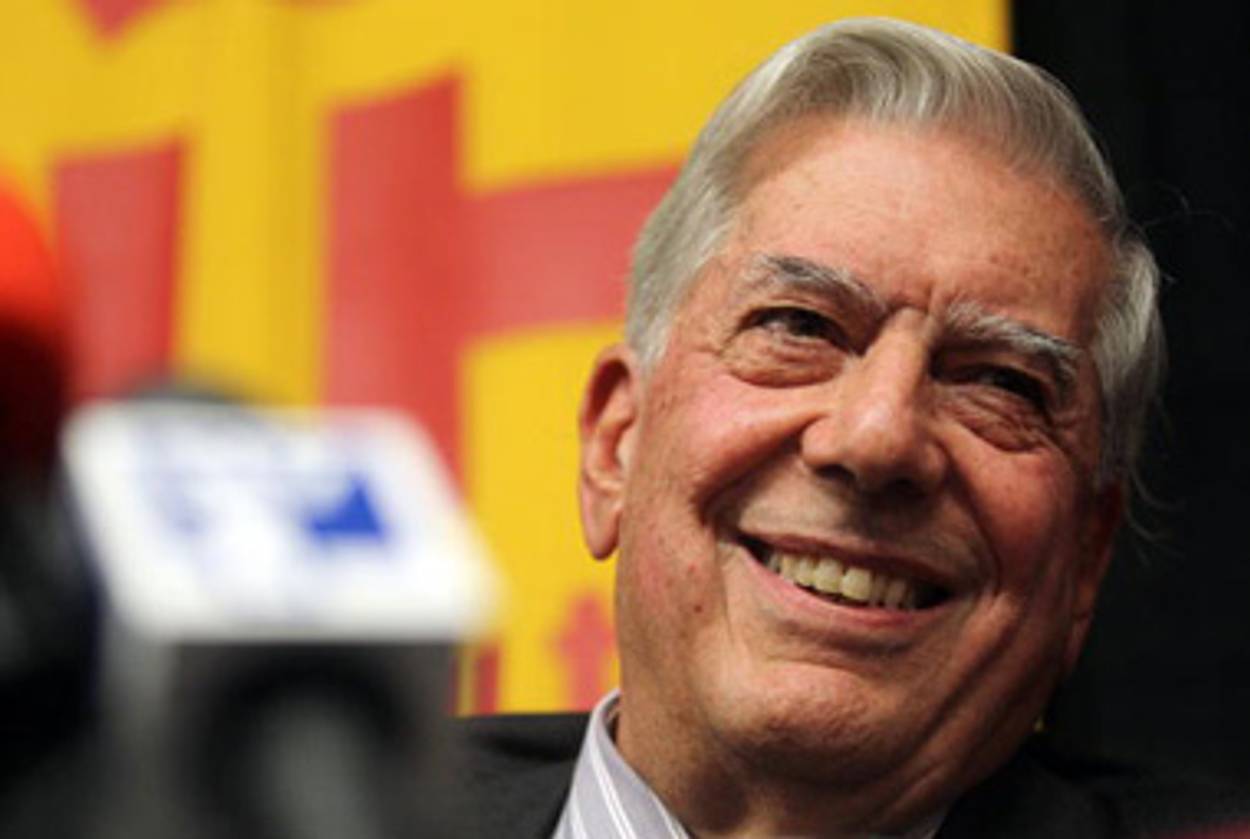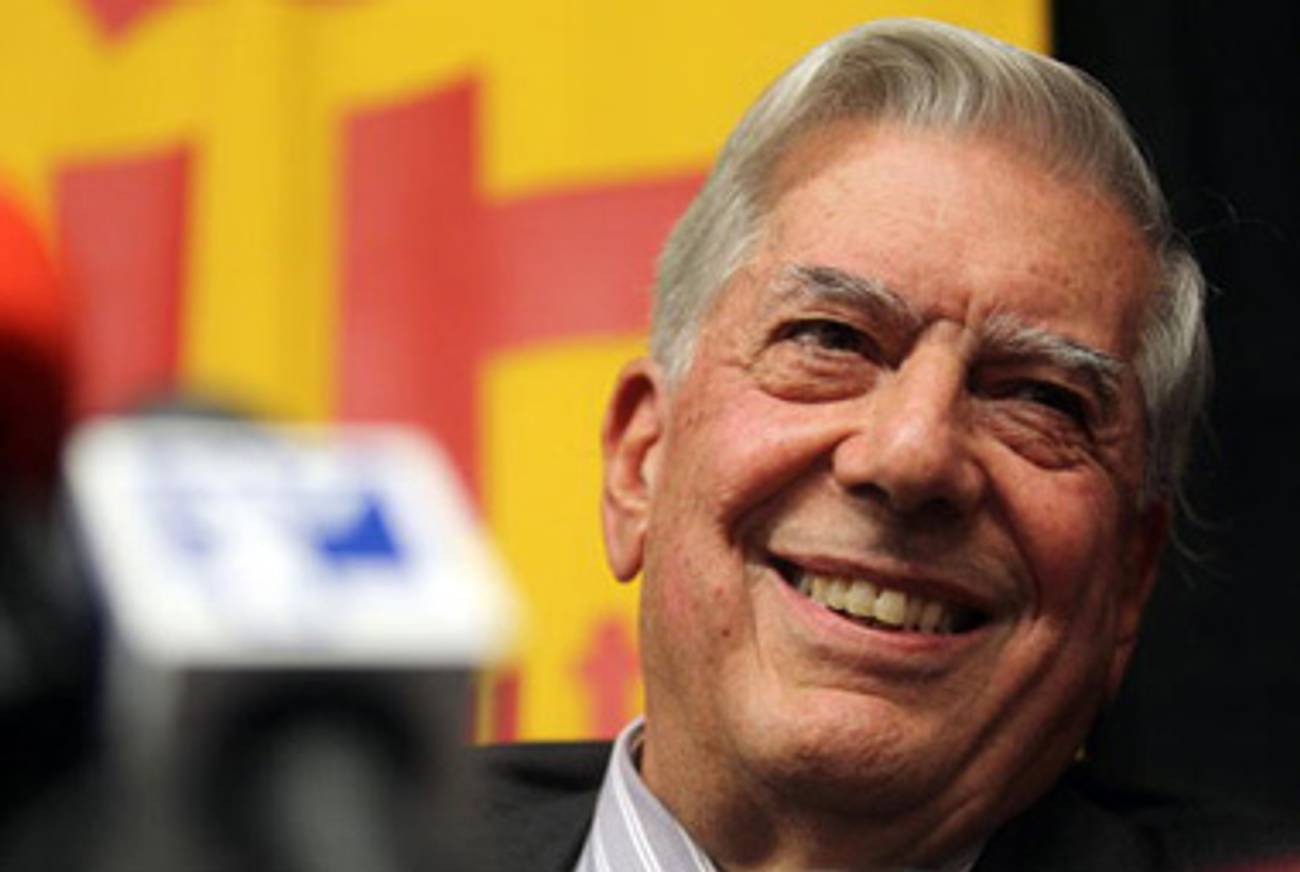Nobel Soul
Mario Vargas Llosa, this year’s winner of the Nobel Prize in Literature, is a lifelong defender of ethnic minorities—and a committed Judeophile




Mario Vargas Llosa, the Peruvian hombre de letras who was awarded the 2010 Nobel Prize in Literature last week, is a man with voracious intellectual appetites. His Balzacian novels, from The Green House to The Way to Paradise, recreate, in symphonic fashion, the multilayered world of modern-day Latin America. And through his essays, particularly after his defeat in his country’s 1990 presidential race, he has considered the multiple forces that shape Latin American life—without ignoring the region’s Jews.
In recent years, he has also ventured beyond his immediate habitat, writing about Jews in other parts of the world, including Israel. Indeed, judging by Vargas Llosa’s admirable oeuvre, one reaches the conclusion that, while he may be a measured critic of Israel—especially since the failure of the Oslo Accords—he is essentially a Judeophile.
One of Vargas Llosa’s heroes is Isaiah Berlin, the liberal thinker and Oxford philosopher, about whom Vargas Llosa has published a number of eloquent essays focusing especially on the duality of the hedgehog and the fox, which, according to Berlin, represent the two ways of approaching the world: one boiling down everything to a single idea, the other looking at things eclectically. Equally attractive to Vargas Llosa is Berlin’s concept of negative liberty, in which humans are free insofar as their freedom doesn’t curtail that of others. He has been a champion of individual and collective liberty in the Spanish-speaking world, but that liberty, in his eyes, must not go unchecked: We should advance our personal and national interests only as part of a project that safeguards pluralism.
The issue of minorities and the role they play in a democracy is central for Vargas Llosa. In his weekly columns for the Spanish daily El País he has frequently written about Arabs in France, Turks in Germany, Mexicans in the United States, and Haitians in the Dominican Republic. These explorations, to my mind, are extensions of his 1987 novel El Hablador (The Storyteller). Saúl Zuratas, the book’s Jewish protagonist, is an anthropology student of Sephardic descent who, in an attempt to harmonize his Jewish and Peruvian selves, decides to abandon scientific research and become a storyteller for the Machiguenga tribe. To tell stories, and to use them as repositories of ancestral memory, is Zuratas’ way to help the Machiguengas survive—and to help him make his own fractured identity whole.
While The Storyteller isn’t usually ranked among Vargas Llosa’s most accomplished works—it is modest in contrast with epic tapestries like Conversation in the Cathedral and The War of the End of the World—it is, I’m convinced, one of his most courageous performances. Its message is that minorities in Peru, to retain their mission, need to be bridges. It also presents a Jewish character who stands in stark contrast with the sorts of Jewish stereotypes that persist in a land where The Protocols of the Elders of Zion can be found on newsstands and Osama Bin Laden is a popular hero.
Vargas Llosa’s writings on Jewish themes include a slim, seldom-mentioned, book-length essay on the Middle Eastern conflict, Israel/Palestina: Paz o Guerra Santa (Israel/Palestine: Peace or Holy War), illustrated with photographs by the author’s daughter Morgana. It resulted from a trip to Israel in 2005 to chronicle Israel’s disengagement from Gaza. He had won the Jerusalem Prize a decade earlier, and his novels, translated into Hebrew, are popular in Israel. However, the columns Vargas Llosa wrote on the topic, and the essay into which he turned them, generated tangible discomfort among Israelis, mostly on the right of the political spectrum, who suggested that Vargas Llosa’s prescriptions came without a full knowledge of the conflict and its complexities.
For Vargas Llosa, the Oslo Accords became the moment when the writer’s love for things Jewish began truly to conflict with the Israeli government’s policies toward Palestinians—although he was quick to stress that it was the government and not the country’s people with whom he took issue. Indeed, he has become something of a thorn in Israel’s side, talking publicly against the living conditions in Gaza, portraying Netanyahu as intransigent—even as he also accuses Hamas of resorting to treacherous, irrational behavior. His dovish position might be embraced by Washington—and, one assumes, by Stockholm—but among European intellectuals it is increasingly understood as naïve.
In Israel, whose Amos Oz and David Grossman have long been discussed as leading Nobel contenders, the choice was widely seen as a snub. But such a reaction is childish. On today’s intellectual stage, no figure with a large following can afford to take an uncritical stand toward Israel. Vargas Llosa’s philo-Semitism, on the other hand, which might be seen as charming in its innocence, as such, is reminiscent of the work of Jorge Luis Borges, never a Nobel laureate himself but another Jerusalem Prize recipient.
In the Latin American landscape, where order and chaos, reason and barbarism, dance forever to a syncopated rhythm, Vargas Llosa is an enlightened voice. He is interested in the depths and complexities of contemporary Jewish life, which is more than one can say of the majority of the hemisphere’s intelligentsia.
Ilan Stavans is Lewis-Sebring Professor in Latin America and Latino Culture at Amherst College. He is the author of the Nextbook Press title Resurrecting Hebrew and most recently, with Mordecai Drasche, of With All Thine Heart: Love and the Bible.
Ilan Stavans is the Lewis-Sebring Professor of Humanities and Latin American and Latino Culture at Amherst College, the publisher of Restless Books, and a consultant to the Oxford English Dictionary. His book Sabor Judio: The Jewish Mexican Cookbook (Ferris & Ferris, co-written with Margaret Boyle), will be out in October.